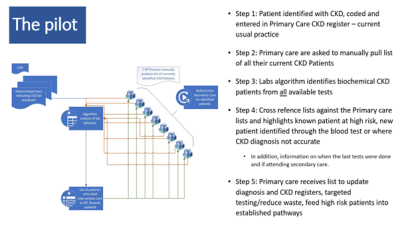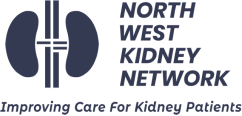CKD Surveillance with Primary care Assessment and Notification (SPAN)
Working across primary and secondary care to deliver a novel approach to the identification and management of patients with chronic kidney disease (CKD), a major risk factor for cardiovascular disease.
Kidney disease is a public health emergency, with national and local data suggesting unwarranted variation in care. In the UK, around 7.2 million people, accounting for over 10% of the population, live with CKD. Without intervention CKD will continue to rise year on year with target intervention required to halt progression.
Dr Beng So is the clinical lead for Lancashire and South Cumbria (L&SC) CKD project. The early pilot phase was initially developed in Lancashire teaching hospital and with funding has progressed beyond the initial pilot phase and developed into L&SC, CKD SPAN NWKN project .
Read moreThe project is piloting a novel algorithm driven system for accurate detection of CKD in the community. This work has been co-created with primary care and health informatic experts.
This novel transformational initiative focuses on the development, testing and roll out of an algorithm driven end-to-end system in conjunction with primary care teams. This process brings together primary care CKD registers and laboratory confirmed CKD cases so that primary care practices can validate their registers in a timely fashion and crucially review them regularly as chronic health conditions are not binary but dynamic. This system ensures correct diagnosis and coding so interventions to optimise treatment can take place swiftly and prevent progression to expensive life limiting dialysis therapy.
The algorithm is undergoing continuous refinement as a key tenet of the program and piloted across 8 GP practices. We believe that the programs likely benefits being a reduction over time of those advancing to end stage kidney disease requiring dialysis and efficiency gains in Primary Care practices that take part. This has also been presented nationally and positively received by the kidney and primary care community.
Scaling the pilot is aligned to the recommendations of the NHS long term plan spanning across prevention, diagnosis, and management of long-term conditions. It is also aligned to the National Renal Service Transformation Programmes recommendations for CKD and the Renal GIRFT recommendations specifically the integration of CKD care, improving coding, earlier detection, better case finding, supporting monitoring and risk reduction. Our proposed strategy also aligns with the objectives of the Core20PLUS5 initiative, seeking to enhance overall health outcomes and reduce health inequalities within the L&SC ICB through earlier diagnosis and reducing late presentation to dialysis which disproportionately affects disadvantaged communities.
All biochemical results within the locality are stored centrally in the regional laboratory databases. Using the developed algorithm, it is possible to identify almost all patients with CKD from the database and provide these data to primary care on a regular basis in an easy to access format. This supports practices to validate their CKD register regularly and gain feedback from primary care teams to further improve the algorithm ensuring accurate records for each patient. In effect, also creating a joint CKD register across secondary and primary care.
A co-created model with GPs, nurses, clinical scientists, and patients ensured the algorithm only included genuine cases. This is linked with the most recent calculated Kidney Failure Risk Estimates, nephrology clinic referral status and highlights where individual tests are overdue. These are cross referenced with primary care CKD registers and reported back to the individual practice. A practice manager or CKD lead can then review these data and if in agreement, chose to accept the recommendations significantly reducing the time spent if performed manually.
Decision flow charts are also provided to help embed this model and quick reference guides for coding, testing intervals and drug treatments option by CKD stage for a comprehensive package addressing CKD care at population, practice and individual level.
The model reduces unnecessary testing where this has already occurred in other settings reducing laboratory demand and streamlines the referral process for specialist involvement, at the optimal timepoint for each CKD patient to prevent morbidity and premature mortality.

| Title | Filename | Date Posted | Extension | Size |
|---|---|---|---|---|
| L&SC CKD SPAN - NWKN 26.03.2025 v5 | L_and_SC_CKD_SPAN_-_NWKN_26.03.2025_v5.pptx | 08/04/2025 | pptx | 2.96 MB |
| KFRE education poster v2 | KFRE_education_poster_v2.pdf | 14/08/2025 | 0.24 MB | |
| Hyperkalaemia management guideline | Hyperkalaemia_management_guideline.pdf | 14/08/2025 | 0.68 MB | |
| CKD primary care management tool v1.0 | CKD_primary_care_management_tool_v1.0.docx | 08/09/2025 | docx | 0.28 MB |







